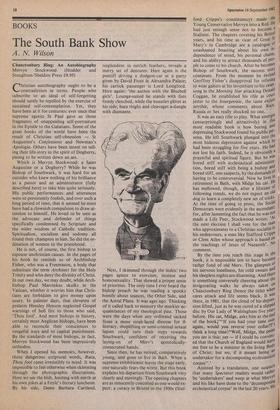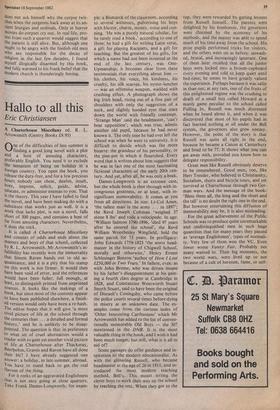BOOKS
The South Bank Show
A. N. Wilson
Christian autobiography ought to be a contradiction in terms. People who subscribe to an ideal of self-forgetting should surely be repelled by the exercise of sustained self-contemplation. Yet, they have been at it for centuries: ever since that supreme egotist St Paul gave us those fragments of unappealing self-portraiture in the Epistle to the Galatians. Some of the great books of the world have been the result of Christian self-obsession — St Augustine's Confessions and Newman's Apologia. Others have been intent on tell- ing their life-story in the spirit of Dogberry, pining to be written down an ass.
Which is Mervyn Stockwood: a Saint Augustine or a Dogberry? While he was Bishop of Southwark, it was hard for an outsider who knew nothing of his brilliance as a pastor and an administrator (fully described here) to take him quite seriously. His public performances and utterances were so persistently foolish, and over such a long period of time, that it seemed he must have had a clownish compulsion to draw at- tention to himself. He loved to be seen as the advocate and defender of things specifically condemned by Scripture and the wider wisdom of Catholic tradition. Spiritualism, socialism and sodomy all found their champion in him. So did the or- dination of women to the priesthood.
He is not, of course, the first bishop to espouse unchristian causes. In the pages of his book he reminds us of Archbishop Fisher, who was a Freemason, a body that substitute the term Architect for the Holy Trinity and who deny the divinity of Christ. In our own day, we may doubt, while Arch- bishop Paul Marcinkus skulks in the Vatican, whether it worries him that Chris- tians are forbidden to give money upon usury. In palmier days, that cleverest of prelates Hensley Henson neglected Gospel warnings of hell fire to those who said, `Thou fool'. And most bishops in history, certainly most Anglican bishops, have been able to reconcile their consciences to vengeful wars and to capital punishment. By the standards of most bishops, in fact, Mervyn Stockwood has been impressively orthodox.
When I opened his memoirs, however, those dangerous scriptural words, Raca, Thou fool came irresistibly to mind. It was impossible to feel otherwise when skimming through the photographic illustrations. Here we see the bish, hooting with mirth at his own jokes at a Foyle's literary luncheon. By his side, Dame Barbara Cartland,
resplendent in ostrich feathers, reveals a merry set of dentures. Here again is the pontiff driving a dodgem-car at a party given by David Frost in Alexandra Palace; his carsick passenger is Lord Longford. Here again: 'the author with the Bluebell girls'. Lounge-suited he stands with fists firmly clenched, while the beauties glitter at his side, bare thighs and cleavages a-dangle with diamante.
Next, I skimmed through the index: two pages apiece to exorcism, incense and homosexuality. That shewed a proper sense of priorities. The only time I ever heard the bishop preach he was reading a spooky homily about seances, the Other Side, and the Astral Plane. It was ages ago. Thinking of it called back to memory the murkier ac- quaintances of my theological past. Those were the days when any ordinand sacked from a more strait-laced diocese for il- literacy, shoplifting or semi-criminal sexual lapses could turn their steps towards Southwark, confident of receiving the laying-on of Merv's apostolically- consecrated hands.
Since then, he has retired, comparatively young, and gone to live in Bath. When a supreme exhibitionist leaves the stage early, one naturally fears the worst. But this book explains his departure from Southwark very clearly and movingly. The opening chapters are as innocently conceited as one would ex- pect: a curacy in Bristol in the 1930s (Staf- ford Cripps's constituency) made the Young Conservative Mervyn into a Red. He had just enough sense not to become a Stalinist. The chapters covering his Bristol years, and his time as vicar of Great St Mary's in Cambridge are a catalogue of In- dependence boasting about his own of mind, his personal charm, and his ability to attract thousands of peo- ple to come to his church. After he becomes Bishop of Southwark, the success story continues. From the moment he excited Geoffrey Fisher's disapproval for refusing to wear gaiters at his investiture to his swan- song in the Morning Star attacking Donald Coggan, he established his role as court jester to the bourgeoisie, the tame enfant terrible, whose comments about Race, Russia or Sex really shocked no one. It was an easy role to play. What emerges (unsurprisingly and attractively) in this most readable book is how boring and depressing Stockwood found his public per- sona. He left Southwark plunged into the most hideous depression against which he had been struggling for five years. He had not lost his faith. Indeed, he is obviously a prayerful and spiritual figure. But he was bored stiff with ecclesiastical administra- tion, bored stiff with being a bishop and bored stiff, one suspects, by the demands 0,1 having to be controversial. Now he lives ill retirement in Bath, with Midge his cat. He has mellowed, though, after a lifetime °I, following trends, we do not expect an old dog to learn a completely new set of tricks. At the time of going to press, the Social Democrats were evidently in the ascendant; for, after lamenting the fact that he was not made a Life Peer, Stockwood writes: 'At the next election I shall vote for the marl who approximates to a Christian socialist in his endeavours, a man like Stafford CripPs or Clem Atlee whose approach is based 00 the teachings of Jesus of Nazareth'. No comment.
By the time you reach this stage in the book, it is impossible not to have become rather fond of old Merv. The glimpses of his nervous loneliness, his cold sweats and his sleepless nights are disarming. And there is something conversely cheering about the invigorating walks he always takes on Chanctonbury Ring (hence the title) when cares attack and life seems black. It was there, in 1981, that the cloud of his depres' sion lifted, just as he was cured of a slipped disc by Our Lady of Walsingham five Years, before. His cat, Midge, asks him at the end of the booki"`If you had your time over again, would you reverse your collarfl I think a long timeX"Well, Midge, the Polat you see is this: yes — if I could be convinc. ed that the Church of England would leave me free to be a minister in the living BonY of Christ; but no, if it meant being ari, undertaker for a decomposing ecclesiastical corpse" .' Assisted by a translation, one suspects that many Spectator readers would rather be 'undertakers' and weep at what Mervyn and his like have done to the 'decomposing ecclesiastical corpse' in the last 20 years. He
does not ask himself why the corpse twit- ches when the surgeons hack away at its an- cient liturgies and ordinals. Only in horror movies do corpses cry out. In real life, pro- test from such a quarter would suggest that the patient is still alive. But, although one ought to be angry with the foolish old men who are responsible for the decay of religion in the last few decades, I found myself illogically disarmed by this book, and fully warmed to his frank belief that the modern church is thunderingly boring.



































 Previous page
Previous page